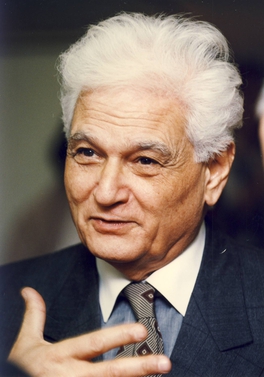Jacques Derrida facts for kids
Quick facts for kids
Jacques Derrida
|
|
|---|---|
 |
|
| Born |
Jackie Élie Derrida
15 July 1930 El Biar, French Algeria
|
| Died | 9 October 2004 (aged 74) Paris, France
|
| Education | École normale supérieure (BA, MA, Dr. cand.) Harvard University (postgrad) University of Paris (DrE) |
| Spouse(s) |
Marguerite Aucouturier
(m. 1957) |
| Era | 20th-century philosophy |
| Region | Western philosophy |
| School |
|
| Institutions |
|
|
Notable ideas
|
|
Jacques Derrida ( born Jackie Élie Derrida; 15 July 1930 – 9 October 2004) was an Algerian-born French philosopher. He is known for developing the philosophy of deconstruction.
During his career, Derrida published more than 40 books, together with hundreds of essays and public presentations. He had a significant influence on the humanities and social sciences, including philosophy, literature, law, anthropology, historiography, applied linguistics, sociolinguistics, psychoanalysis, music, architecture, and political theory.
Into the 2000s, his work retained major academic influence throughout the United States, continental Europe, South America and all other countries where continental philosophy has been predominant, particularly in debates around ontology, epistemology (especially concerning social sciences), ethics, aesthetics, hermeneutics, and the philosophy of language.
Life
Derrida was born on 15 July 1930, in Algeria. His father, Haïm Aaron Prosper Charles (known as "Aimé") Derrida (1896–1970), worked all his life for the wine and spirits company Tachet. His parents named him "Jackie", "which they considered to be an American name", although he would later adopt a more "correct" version of his first name when he moved to Paris.
Derrida was the third of five children. He spent his youth in Algiers and in El-Biar. He secretly skipped school for a year and took part in numerous football competitions (he dreamed of becoming a professional player). In this adolescent period, Derrida found in the works of philosophers and writers (such as Rousseau, Nietzsche, and Gide) an instrument of revolt against family and society. His reading also included Camus and Sartre.
In the late 1940s, he attended the Lycée Bugeaud, in Algiers; in 1949 he moved to Paris, attending the Lycée Louis-le-Grand. Derrida received a grant for studies at Harvard University, and spent the 1956–57 academic year reading James Joyce's Ulysses at the Widener Library. In June 1957, he married the psychoanalyst Marguerite Aucouturier in Boston. During the Algerian War of Independence of 1954–1962, Derrida asked to teach soldiers' children in lieu of military service, teaching French and English from 1957 to 1959.
Following the war, from 1960 to 1964, Derrida taught philosophy at the Sorbonne, where he was an assistant of Suzanne Bachelard. His wife, Marguerite, gave birth to their first child, Pierre, in 1963. In 1964, on the recommendation of Louis Althusser and Jean Hyppolite, Derrida got a permanent teaching position at the ENS, which he kept until 1984.
With "Structure, Sign, and Play in the Discourse of the Human Sciences", his contribution to a 1966 colloquium on structuralism at Johns Hopkins University, his work began to gain international prominence. His second son, Jean, was born in 1967. In the same year, Derrida published his first three books—Writing and Difference, Speech and Phenomena, and Of Grammatology.
In 1980, he received his first honorary doctorate (from Columbia University).
Derrida traveled widely and held a series of visiting and permanent positions. He became full professor (directeur d'études) at the École des Hautes Études en Sciences Sociales in Paris from 1984 (he had been elected at the end of 1983). With François Châtelet and others he in 1983 co-founded the Collège international de philosophie (CIPH; 'International college of philosophy'), an institution intended to provide a location for philosophical research which could not be carried out elsewhere in the academia. He was elected as its first president. In 1985 Sylviane Agacinski gave birth to Derrida's third child, Daniel.
On 8 May 1985, Derrida was elected a Foreign Honorary Member of the American Academy of Arts and Sciences, to Class IV – Humanities, Section 3 -Criticism and Philology.
In 1986 Derrida became Professor of the Humanities at the University of California, Irvine, where he taught until shortly before his death in 2004.
Derrida was a regular visiting professor at several other major American and European universities, including Johns Hopkins University, Yale University, New York University, Stony Brook University, The New School for Social Research, and European Graduate School.
He was awarded honorary doctorates by the University of Cambridge (1992), Columbia University, The New School for Social Research, the University of Essex, Katholieke Universiteit Leuven, the University of Silesia, the University of Coimbra, the University of Athens, and many others around the world. In 2001, he received the Adorno-Preis from the University of Frankfurt.
Late in his life, Derrida participated in making two biographical documentaries, D'ailleurs, Derrida (Derrida's Elsewhere) by Safaa Fathy (1999), and Derrida by Kirby Dick and Amy Ziering Kofman (2002).
Derrida was diagnosed with pancreatic cancer in 2002. He died during surgery in a hospital in Paris in the early hours of 9 October 2004.
Major works
- Structure, Sign and Play in the Discourse of the Human Sciences (1966), it was published in 1967 as Chapter 10 of Writing and Difference.
- Of Grammatology (1967) Translated by Gayatri C. Spivak in 1976
- Speech and Phenomena : And Other Essays on Husserl's of Sign (1967) Or, Voice and Phenomena: Introduction to the Problem of the Sign in Husserl's Phenomenology (1967)
- Writing and Difference (1967) Trans. in 1978
- Margins of Philosophy (1972)
- Signature Event Context (1972)
- Positions (1972)
See also
 In Spanish: Jacques Derrida para niños
In Spanish: Jacques Derrida para niños

